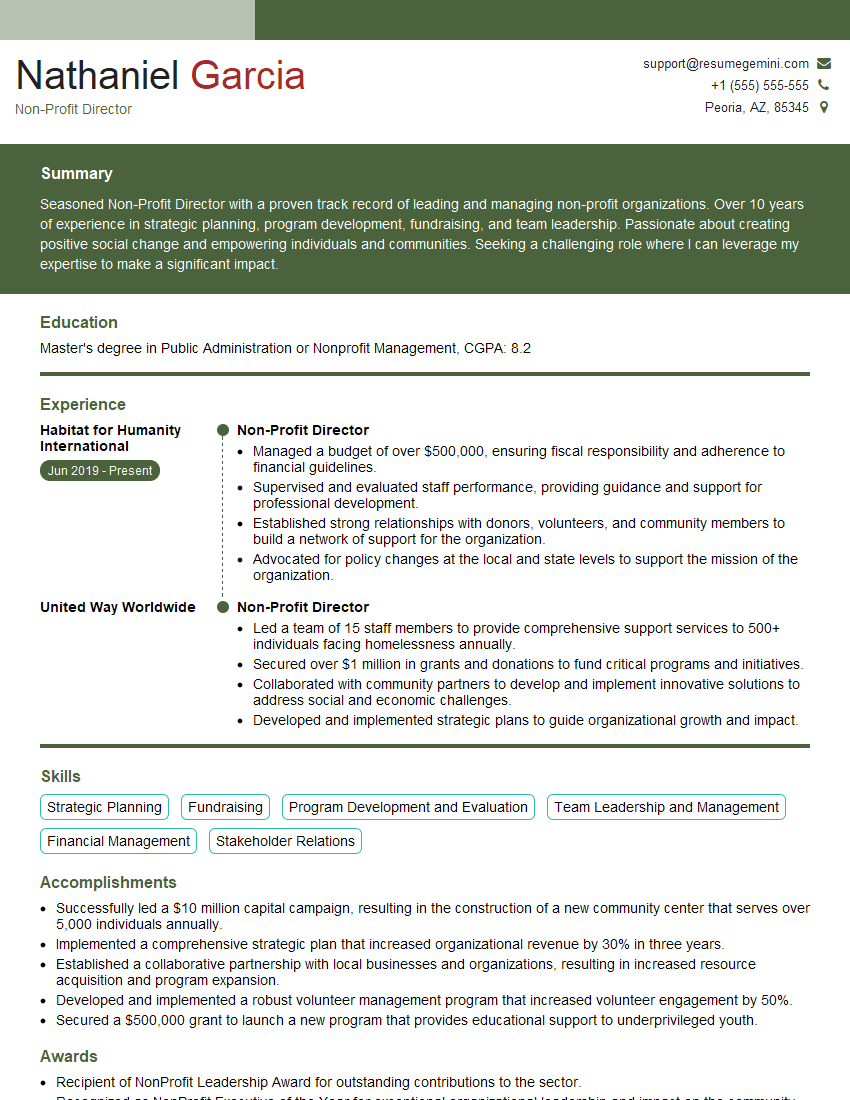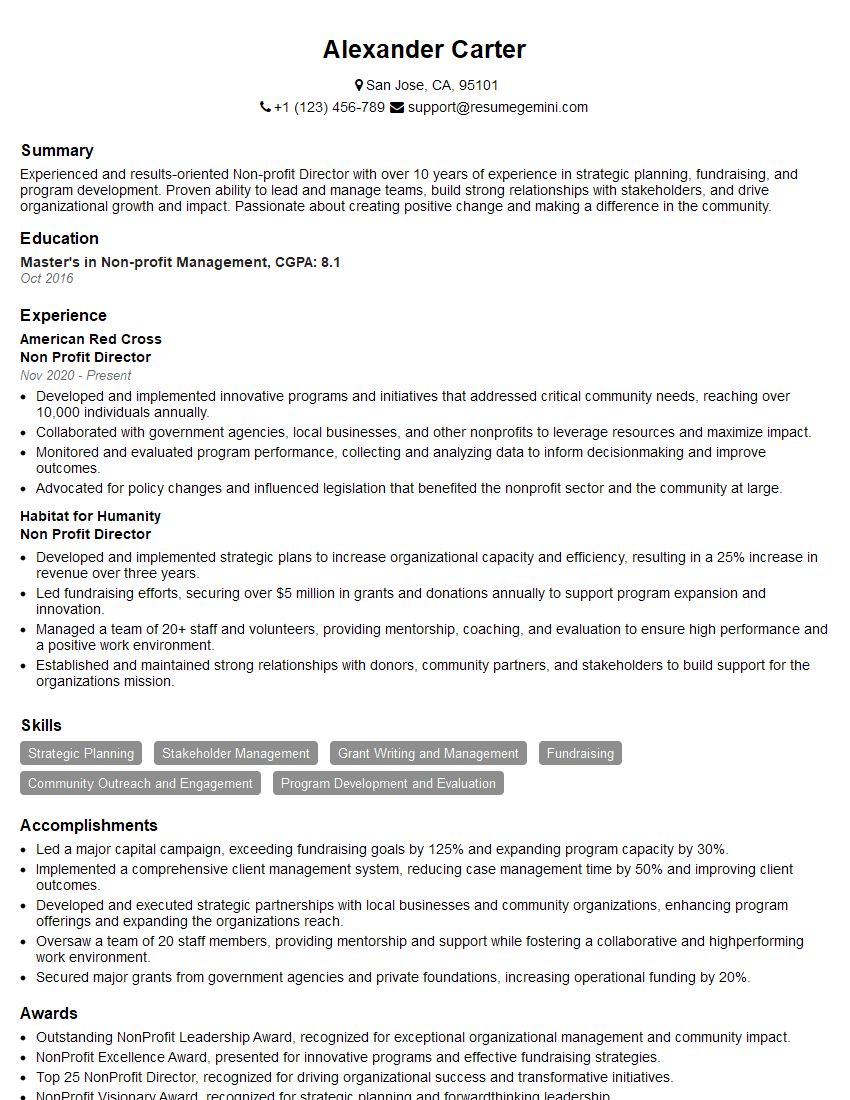Are you gearing up for a career shift or aiming to ace your next interview? Look no further! We’ve curated a comprehensive guide to help you crack the interview for the coveted Non-Profit Director position. From understanding the key responsibilities to mastering the most commonly asked questions, this blog has you covered. So, buckle up and let’s embark on this journey together.
Acing the interview is crucial, but landing one requires a compelling resume that gets you noticed. Crafting a professional document that highlights your skills and experience is the first step toward interview success. ResumeGemini can help you build a standout resume that gets you called in for that dream job.
Essential Interview Questions For Non-Profit Director
1. How would you develop a strategic plan for a non-profit organization?
To develop a strategic plan, I would follow these steps:
- Conduct a thorough assessment of the organization’s current situation, including its strengths, weaknesses, opportunities, and threats.
- Develop a clear mission statement and set specific, measurable, achievable, relevant, and time-bound goals.
- Identify key strategies to achieve the goals and develop a detailed implementation plan.
- Monitor and evaluate progress regularly and make adjustments as needed.
- Communicate the strategic plan to stakeholders and ensure buy-in from all levels of the organization.
2. What are your experiences in fundraising for non-profit organizations?
Throughout my career, I’ve played a leading role in fundraising for non-profits:
- Developed and implemented successful fundraising campaigns that exceeded targets.
- Built and nurtured relationships with donors, including individuals, corporations, and foundations.
- Managed donor databases and tracked fundraising progress using CRM systems.
- Collaborated with other departments to align fundraising efforts with the organization’s overall mission and goals.
- Ensured compliance with all applicable laws and regulations related to fundraising.
3. How would you manage a team of employees and volunteers in a non-profit organization?
Effective team management in a non-profit involves the following:
- Creating a positive and supportive work environment where all team members feel valued and motivated.
- Setting clear expectations and providing regular feedback to help team members grow and develop.
- Delegating tasks and responsibilities based on strengths and capabilities.
- Recognizing and rewarding team achievements.
- Fostering collaboration and open communication among team members.
- Providing opportunities for professional development and training.
4. How would you evaluate the effectiveness of a non-profit organization’s programs?
To evaluate program effectiveness, I use a comprehensive approach:
- Identify clear program goals and objectives.
- Develop metrics and collect data to measure progress towards those goals.
- Analyze data and identify areas for improvement.
- Provide regular feedback to program staff and stakeholders.
- Use evaluation findings to inform decision-making and improve program outcomes.
5. What are your experiences in grant writing and management?
Throughout my career, I have honed my grant writing and management abilities:
- Successfully secured grants from various federal, state, and private funding sources.
- Developed compelling grant proposals that clearly articulate the need, goals, and impact of proposed projects.
- Managed grant budgets and ensured compliance with all grant requirements.
- Collaborated with program staff to develop and implement grant-funded projects.
- Prepared grant reports and provided updates to funders on project progress.
6. How would you build and maintain relationships with donors and other stakeholders?
Relationship-building is crucial for non-profit success:
- Identify and cultivate relationships with potential and existing donors.
- Regularly communicate with donors to provide updates on the organization’s work and impact.
- Personalize interactions and show appreciation for donor support.
- Involve donors in the organization’s activities and decision-making processes.
- Build relationships with other stakeholders such as community partners, volunteers, and beneficiaries.
7. How would you handle challenging situations, such as dealing with difficult donors or negative media attention?
I approach challenging situations with the following strategies:
- Remain calm and professional, even under pressure.
- Listen actively to understand the concerns of the other party.
- Respond with empathy and understanding, while clearly communicating the organization’s position.
- Work towards finding mutually acceptable solutions.
- Involve other staff or board members as needed for support or guidance.
8. What are your thoughts on the role of technology in non-profit organizations?
Technology plays a vital role in non-profit success:
- Leverage technology to streamline operations, improve efficiency, and reduce costs.
- Utilize technology for fundraising, donor management, and program delivery.
- Use social media and online platforms to engage with stakeholders and build community.
- Explore innovative technologies to enhance the organization’s impact.
- Ensure data security and privacy compliance.
9. What are the ethical considerations that non-profit organizations need to be aware of?
Non-profits must prioritize ethical considerations:
- Uphold the organization’s mission and values in all activities.
- Ensure transparency and accountability in financial management.
- Respect donor privacy and use funds responsibly.
- Avoid conflicts of interest and maintain the highest standards of conduct.
- Comply with all applicable laws and regulations.
10. How do you stay up-to-date on the latest trends and best practices in the non-profit sector?
To stay informed about industry trends and best practices, I utilize various strategies:
- Attend industry conferences and workshops.
- Read professional publications and online resources.
- Network with other non-profit professionals.
- Participate in continuing education programs.
- Seek guidance from mentors or advisors in the field.
Interviewers often ask about specific skills and experiences. With ResumeGemini‘s customizable templates, you can tailor your resume to showcase the skills most relevant to the position, making a powerful first impression. Also check out Resume Template specially tailored for Non-Profit Director.
Career Expert Tips:
- Ace those interviews! Prepare effectively by reviewing the Top 50 Most Common Interview Questions on ResumeGemini.
- Navigate your job search with confidence! Explore a wide range of Career Tips on ResumeGemini. Learn about common challenges and recommendations to overcome them.
- Craft the perfect resume! Master the Art of Resume Writing with ResumeGemini’s guide. Showcase your unique qualifications and achievements effectively.
- Great Savings With New Year Deals and Discounts! In 2025, boost your job search and build your dream resume with ResumeGemini’s ATS optimized templates.
Researching the company and tailoring your answers is essential. Once you have a clear understanding of the Non-Profit Director‘s requirements, you can use ResumeGemini to adjust your resume to perfectly match the job description.
Key Job Responsibilities of a Non-Profit Director
The Non-Profit Director is responsible for directing the operations of a non-profit organization. This includes overseeing all aspects of the organization, from fundraising and budgeting to program development and implementation. The Non-Profit Director works closely with the board of directors to set the strategic direction of the organization and ensure that it is meeting its goals.
1. Fundraising and Development
The Non-Profit Director is responsible for raising funds to support the organization’s mission. This involves developing and implementing fundraising strategies, cultivating relationships with donors, and managing the organization’s finances.
- Develop and implement fundraising strategies
- Cultivate relationships with donors
- Manage the organization’s finances
2. Program Development and Implementation
The Non-Profit Director is responsible for developing and implementing programs that meet the organization’s mission. This involves working with staff and volunteers to create and deliver programs that are effective and sustainable.
- Develop and implement programs that meet the organization’s mission
- Work with staff and volunteers to create and deliver programs
- Ensure that programs are effective and sustainable
3. Board Relations
The Non-Profit Director works closely with the board of directors to set the strategic direction of the organization and ensure that it is meeting its goals. This involves providing the board with regular updates on the organization’s progress, and working with the board to develop and implement policies and procedures.
- Provide the board with regular updates on the organization’s progress
- Work with the board to develop and implement policies and procedures
- Ensure that the organization is meeting its goals
4. Staff Management
The Non-Profit Director is responsible for managing the staff of the organization. This involves hiring, training, and supervising staff, and creating a positive and productive work environment.
- Hire, train, and supervise staff
- Create a positive and productive work environment
- Ensure that staff are meeting their goals
Interview Preparation Tips for a Non-Profit Director
Preparing for an interview for a Non-Profit Director position can be daunting, but there are a few things you can do to increase your chances of success.
1. Research the Organization
Before your interview, take some time to research the organization you’re applying to. This will help you understand their mission, values, and goals. It will also help you answer questions about why you’re interested in working for the organization and how your skills and experience can benefit them.
- Visit the organization’s website
- Read the organization’s annual report
- Talk to people who work for or volunteer with the organization
2. Practice Your Answers to Common Interview Questions
There are a few common interview questions that you’re likely to be asked in an interview for a Non-Profit Director position. These questions include:
- Tell me about your experience in fundraising and development.
- What are your thoughts on the organization’s mission?
- How do you plan to work with the board of directors?
- What are your strengths and weaknesses as a leader?
Take some time to practice your answers to these questions so that you can deliver them confidently and concisely.
3. Dress Professionally
First impressions are important, so make sure you dress professionally for your interview. This means wearing a suit or dress pants and a button-down shirt or blouse. You should also make sure your clothes are clean and pressed.
4. Be Yourself
The most important thing is to be yourself during your interview. The interviewer wants to get to know the real you, so don’t try to be someone you’re not. Just relax, be yourself, and let your personality shine through.
Next Step:
Armed with this knowledge, you’re now well-equipped to tackle the Non-Profit Director interview with confidence. Remember, a well-crafted resume is your first impression. Take the time to tailor your resume to highlight your relevant skills and experiences. And don’t forget to practice your answers to common interview questions. With a little preparation, you’ll be on your way to landing your dream job. So what are you waiting for? Start building your resume and start applying! Build an amazing resume with ResumeGemini.

